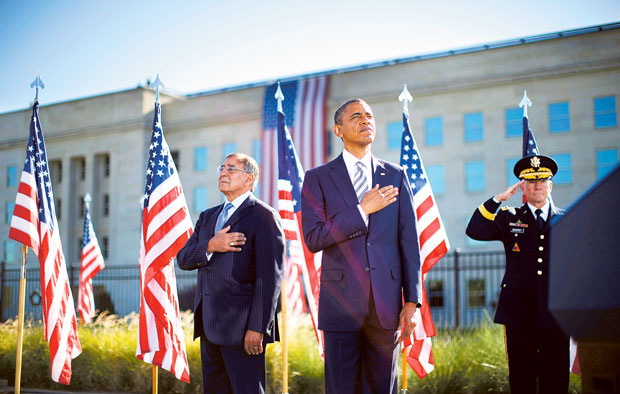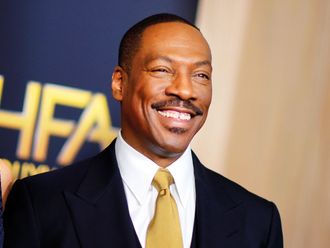
Worthy Fights: A Memoir of Leadership in War and Peace
By Leon Panetta with Jim Newton, Penguin Press, 512 pages, $36
National Insecurity: American Leadership in an Age of Fear,
By David Rothkopf, PublicAffairs, 496 pages, $29.99
National Security and Double Government
By Michael Glennon, OUP, 272 pages, $29.95
If failure deserves never to be rewarded, the Central Intelligence Agency’s paymasters clearly did not read the memo. It makes little difference what event the CIA has missed, its budget and scope only appear to grow.
“The CIA gets what it wants,” President Barack Obama told Leon Panetta, the agency’s then director, who had just read out a list of requests. Obama’s reaction was “uncharacteristically and bracingly decisive”, writes Panetta. Unfortunately, he cannot specify what goodies Obama so readily agreed to. Just as the CIA gets the drone strikes it wants, so it can delete passages from memoirs of former employees — even ones as august as Panetta.
Almost all the publicity around Panetta’s “Worthy Fights” has focused on the handful of paragraphs critical of Obama. “Too often, in my view, the president relies on the logic of a law professor rather than the passion of a leader,” he wrote. That, indeed, is true. But it is hardly news. Panetta’s follow-up interviews have been far stronger. Obama has “lost his way”, says his former Pentagon and CIA chief.
From Islamists in Syria to Putin’s encroachments on eastern Europe, the world’s challenges threaten to overwhelm him. There are few more loyal and discreet Washington operators than Panetta. The fact that even he — like Brutus — is wielding the knife says a lot about the emperor’s waning authority.
In all other respects, Panetta’s book is a traditional Washington memoir — a ploddingly written account of an illustrious career that does it little justice. Panetta came to Washington in the 1960s and never left. On the way, he was a liberal Republican in the Nixon administration, a Democratic congressman from California, chief of staff and budget director to Bill Clinton, and one of Obama’s key people in the successful hunt for Osama Bin Laden.
The last event yields the book’s most interesting passages. Making up for its patchy record, it was the CIA that identified Bin Laden’s hideout in Abbottabad. Panetta was in the situation room when the operation went ahead. Unlike Robert Gates, the then defence secretary (who published “Duty”, his own coruscating memoirs, earlier this year), and Joe Biden, the vice-president, Panetta was all in favour. He credits Obama with the foresight to suggest a back-up helicopter in case the operation went awry. The spare chopper saved the day.
“Worthy Fights” has some telling insights into key Washington figures of the past generation. Bill Clinton is described as “ravenously intelligent”. Lyndon Baines Johnson once telephoned the mother of Panetta’s boss to wish her a happy birthday — a gesture that secured the vote LBJ was seeking. It is impossible to imagine Obama doing such a thing. Washington is a town of towering egos. David Petraeus, who was Panetta’s successor at the CIA, is described as having an office that was “a shrine ... to him”. And so on. But we must turn to other books for insights into the big shifts in US national security policy of the last few years. Of today’s batch, two stand out in very different ways.
The first, “National Insecurity: American Leadership in an Age of Fear”, could lay claim to being the definitive book on how 9/11 affected US foreign policy. As the author of “Running the World (2006) — the most authoritative history to date of the National Security Council — David Rothkopf has interviewed all but one of the NSC advisers since the role was established. Rothkopf started his career working for Henry Kissinger. There is pretty much no decision maker, including Panetta (he appears to have divulged his juiciest thoughts to this book, rather than his own) who has not opened up to Rothkopf.
On the day the aircraft hit the Twin Towers, Rothkopf was having coffee in Georgetown with one former and one future occupant of the role — Anthony Lake, who was Bill Clinton’s first national security adviser, and Susan Rice, who holds the job now. It was an attack that spoke “without translation or dilution to our animal selves”, Rothkopf writes. His aim is to capture what has happened since 9/11 — “a moment when America felt more vulnerable and adrift than at any time in modern memory”.
Rothkopf sets out what is essentially a game of two halves, to borrow a soccer cliché. In the first, George W. Bush’s administration strikes out thoughtlessly — invading Iraq, telling the world it was either for the US or against it, trashing the Geneva Conventions and so on. “It took some time before we could stop, catch our breath and make a critical reappraisal of what we were doing,” Condoleezza Rice tells Rothkopf with some understatement.
In his first term, Bush essentially lost control of his national security machinery. Both Donald Rumsfeld, the Pentagon chief, and Dick Cheney, the vice-president, ran rings around Rice and excluded Colin Powell, the secretary of state, from key decisions, such as disbanding the Iraqi army. In Bush’s second term, the NSC worked more as it should, principally because Rumsfeld and Cheney had been sidelined. By then it was headed by Stephen Hadley, an impressive operator, who kept the trains running on time.
Bush spent much of his second term atoning for the mistakes of the first. But it was too late to make up for such costly mistakes. Rothkopf is unflinching in tallying the price of Bush’s errors, even if he credits him for a belated course correction. “Our reaction [to 9/11] was so overheated, so ill considered, of such scale and so broad in its unintended consequences that it became more defining, constraining and damaging than the original event to which it was intended to respond,” says Rothkopf.
In the second half of the game, Obama dons the captain’s shirt. Again, the team fails to play as it should, although for very different reasons. Under Bush, the US overreacted to 9/11 partly because the NSC failed to perform its role. The White House lacked the co-ordination — and thinking — the NSC was there to provide. Under Obama, the problem is reversed. His priority has been to undo the mistakes of the Bush years. Partly as a result, he runs the most centralised White House in living memory.
The NSC has now grown to 370 staff, which is 10 times its size under Kissinger. It spends its time second-guessing other departments rather than thinking big thoughts. “It is not strategy to simply undo the mistakes of the recent past,” writes Rothkopf.
Bush’s administration was known for blundering into rash decisions. Obama’s will be remembered for agonising over tweets and press releases. Panetta’s memoirs have plenty of examples of junior White House officials rebuking him for talking in public without having first sought their permission. Hillary Clinton’s memoirs, “Hard Choices”, are far too polite to echo that complaint. As Rothkopf concludes: “They [Obama’s White House staff] supplanted the agencies they were supposed to lead, attempted to do their jobs for them, micromanaged decisions, and as a result did not have time to do the strategic planning and co-ordination work that only they could do.” The result has been strategic drift under Obama following the blunders he inherited.
In Rothkopf’s world, it is the big personalities that matter. A good president delegates authority to capable people. George H.W. Bush, whose national security adviser was Brent Scowcroft, is considered the model of how things should work. In their very different ways, Bush Jr and Obama show the opposite.
To Michael J Glennon, in “National Security and Double Government”, the shifting personalities are mere detail. No matter who is elected to run White House and Congress, they are puppets of a permanent apparatus. In less capable hands, Glennon’s thesis might come across as sophomoric. Yet as a scholar who worked on Capitol Hill for years, Glennon is that rare thing: an academic with real world experience.
Instead of a rupture between George W. Bush and Obama, Glennon sees remarkable continuity. Towards the end of his presidency, Bush was asked what most surprised him about the job. “How little authority I have,” he said. That is also what people say about Obama.
Glennon draws an analogy from Walter Bagehot’s portrait of the English system, which was divided between its “dignified institutions” — the monarchy, the Lords, the aristocracy and the pomp — and its “efficient institutions” — the Commons, the City, the bourgeois and the real power. No daylight should be allowed upon the former lest its magic be destroyed.
In today’s Washington, the dignified constitution comprises the three Madisonian branches of government — the presidency, Congress and the Supreme Court. The efficient parts are labelled “Trumanite” after President Harry S. Truman, who set up the NSC, the National Security Agency and the other key planks of Dwight Eisenhower’s “military-industrial complex”.
It might better be called the Data-Intelligence complex. For Glennon’s thesis to work, America’s double government must meet two criteria, he says. First, the Madisonian institutions must appear to have control over the national security agencies. Second, they must not actually have that control.
Glennon identifies 46 federal departments and agencies that generate classified information and 2,000 private companies working for them at 10,000 locations across the US. In theory, the president tells them what to do, Congress gives them the authority and the courts evaluate the legality of their actions. In practice, the agencies write the orders the president issues, draft the laws Congress passes, and appoint the judges to the secret courts that oversee them.
After Edward Snowden’s revelations in 2013 about the NSA’s rampant surveillance activities, officials insisted that there was a “robust legal regime” overseeing it. The numbers tell a different story. Between 1979, when the Foreign Intelligence Surveillance Court was established, and 2013, it received 35,333 surveillance requests from the NSA. All but 12 were given the green light. The judges are appointed at the sole discretion of the Supreme Court’s chief justice. The court’s decisions are secret. No appeals are allowed. Obama ordered an “independent” review of it after the Snowden leaks. Very little has changed.
Great play is also made of Capitol Hill’s oversight. In practice the intelligence agencies brief only eight lawmakers and usually only after the fact. They are not allowed to bring aides or take notes. “We are like mushrooms,” said Norman Mineta, a former US lawmaker. “They keep us in the dark and feed us a lot of manure.”
Few people will read Glennon’s work. It is too academic for popular taste. More will read Rothkopf’s. Still more should do so. As an account of post 9/11 policy making, it is unlikely to be surpassed. By far the largest market will be for Panetta’s memoir because of the publicity around it. However, those who buy the latter should remember that most of the interesting stuff has been left out. Like the man said, the CIA gets what it wants.
–Financial Times








